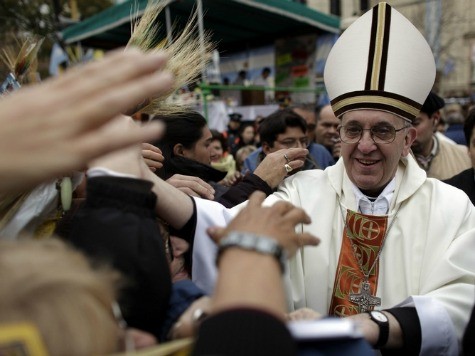The editor of a major digital Catholic evangelization publication writes that, in choosing Pope Francis as its “Person of the Year,” Time made the right choice but for the wrong reasons.
Daniel McInerny, editor of Aleteia’s English language edition, wrote Wednesday that while the pope is a “perfect” and even “obvious” choice for Time’s annual honor, what the publication “got wrong was its reasons for choosing Francis.”
McInerny observes that Time offers its main reason why “this Pope” is so important as “the speed with which he has captured the imaginations of millions who had given up on hoping for the church at all.”
“But what does Time think those millions have really learned from Pope Francis?” McInerny asks.
Time‘s reasoning:
People weary of the endless parsing of sexual ethics, the buck-passing infighting over lines of authority when all the while (to borrow from Milton), “the hungry Sheep look up, and are not fed.” In a matter of months, Francis has elevated the healing mission of the church–the church as servant and comforter of hurting people in an often harsh world–above the doctrinal police work so important to his recent predecessors.
While Francis, McInerny agrees, has demonstrated the fervor of the Christian evangelical spirit, it’s not clear that Time sees Francis as much more than a savvy PR person who has managed to take the Christian message down a notch so that it is more palatable for those who can’t quite make the commitment to the full apostleship of Jesus:
And behind his self-effacing facade, he is a very canny operator. He makes masterly use of 21st century tools to perform his 1st century office. He is photographed washing the feet of female convicts, posing for selfies with young visitors to the Vatican, embracing a man with a deformed face. He is quoted saying of women who consider abortion because of poverty or rape, “Who can remain unmoved before such painful situations?” Of gay people: “If a homosexual person is of good will and is in search of God, I am no one to judge.” To divorced and remarried Catholics who are, by rule, forbidden from taking Communion, he says that this crucial rite “is not a prize for the perfect but a powerful medicine and nourishment for the weak.”
Through these conscious and skillful evocations of moments in the ministry of Jesus, as recounted in the Gospels, this new Pope may have found a way out of the 20th century culture wars, which have left the church moribund in much of Western Europe and on the defensive from Dublin to Los Angeles…
Despite what Time sees as Pope Francis’ “skillful evocations,” there is an admission that the pontiff is bringing about significant change while still holding steadfast to Catholic doctrine:
On the question of female priests: “We need to work harder to develop a profound theology of the woman.” Which means: no. No to abortion, because an individual life begins at conception. No to gay marriage, because the male-female bond is established by God. “The teaching of the church … is clear,” he has said, “and I am a son of the church, but”–and here he adds his prayer for himself–“it is not necessary to talk about those issues all the time.”
However, Time does not simply leave Francis as he is: a charismatic personality who wants to reach outward while not budging on matters of Catholic doctrine – which many might see as what is good about “this Pope.” Instead, Time hopes for more – or less – depending on the perspective, referring to what it views as Francis allowing for some “wiggle room” on homosexuality and the “role of women.”
If that prayer should be answered, if somehow by his own vivid example Francis could bring the church into a new relationship with its critics and dissidents–agreeing to disagree about issues that divide them while cooperating in the urgent mission of spreading mercy–he might unleash untold good. “Argue less, accomplish more” could be a healing motto for our times.
Indeed, as McInerny observes, “Time Magazine… has chosen to view Francis as someone beyond ‘doctrinal police work,’ beyond ‘the culture wars.’ As if Francis is somehow taking us ‘beyond’ the magisterial teaching of John Paul II and Benedict.”
Time, in fact, does seem to place John Paul II and Benedict in the “doctrinal police work” category, while Francis is presented as a man of the street, who can say, “Stop bickering and roll up your sleeves.”
“John Paul II and Benedict XVI were professors of theology. Francis is a former janitor, nightclub bouncer, chemical technician and literature teacher,” the honorary article reads.
In another sharp contrast, Time claims, “The Catholic Church as envisioned by Benedict XVI was one of tightly calibrated spiritual prescriptions,” then observes Francis’ statement, from his Jesuit-published interview, “I see the church as a field hospital after battle…You have to heal the wounds…The church sometimes has locked itself up in small-minded rules.”
“Francis is trying to take us beyond stale categories. But those categories do not include the moral doctrine of the Catholic Church,” concludes McInerny. “No, the categories that Francis wants to take us beyond are those which attempt to reduce the Mystical Body of Christ, the Church, to a human construct, one that fits comfortably with our increasingly secular vision of how the world ought to be.”

COMMENTS
Please let us know if you're having issues with commenting.